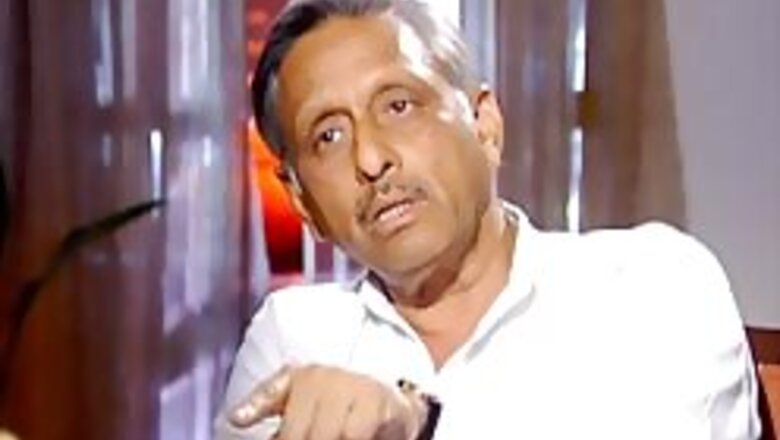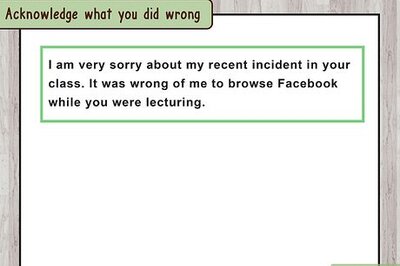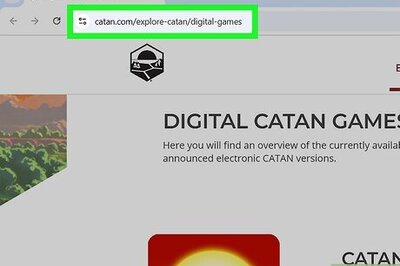
views
Karan Thapar: Hello and welcome to Devil's Advocate. On two separate occasions last year my guest was judged to be the best performing minister in the UPA Government. And yet to everyone's surprise this January he lost his star portfolio, the Petroleum Ministry. What happened and what does he think went wrong.
Here to tell us in an exclusive interview is Mani Shankar Aiyar. Mr Aiyar last year both the Hindustan Times and The India Today judged you to be the best performing minister in the UPA Government and yet this January to everyone's surprise you lost the portfolio. Were you taken aback?
Mani Shankar Aiyar: First I disagree with you that it was the biggest portfolio because I have retained in the Cabinet. So it is not really an obituary for my being a Cabinet Minister of Panchayati Raj though I think we can affect the single biggest revolution rural India is in need of.
But to come back, I will have to confess that the portfolio was taken back. But I must also emphasise that at the time it was given to me I was told very, very clearly and categorically that this is a temporary assignment and that I should see Ahmad Patel before I went to take charge. I did go to see Ahmad but he wasn't there, which is not surprising, so I entered my office and the media was there, and I told them this is a temporary charge. It came out next day that some one from the Cabinet Secretariat had rang me to say that Constitution has no provision for a temporary minister. What I had thought at that time was that this assignment would be for 20 days. When nothing happened for 20 months I thought perhaps people had forgotten that this was a temporary assignment.
Karan Thapar: Which is why I asked the question, when the Prime Minister stripped you up the Petroleum Ministry, did he gave you any explanation?
Aiyar: He rang me to say that I had done a very good job.
Karan Thapar: And so he was taking ministry away.
Aiyar: He said he thought that I had done a very good job.
Karan Thapar: And so I am taking the ministry away.
Aiyar: No, that is not how he put it. He said he thought I had done a very good job and he was still trying to see if I could be retained but it did not appear possible and the Congress President, with whom I had a word on this, emphasised that since it had been a temporary charge, and the first major reshuffle of the Cabinet took place only 20 months later, it was inevitable that as and when the reshuffle took place I would loose that particular portfolio. But I am the only Cabinet Minister as far as I know who still continues to have double portfolio.
Karan Thapar: Let's stick to petroleum for a while. What you are saying suggest that even when Prime Minister rang you, he left you with some hope that you might be able to retain the portfolio although he thought it was unlikely. So in fact he never gave you definitive answer that you are going to loose it until you discovered yourself that you have lost it.
Aiyar: I don't think ministers have any right to definitive answers. We are appointed under the sole prerogative of the Prime Minister.
Karan Thapar: And it can be withdrawn whenever he wants.
Aiyar: I have always said that ministers are dead man walking.
Karan Thapar: Except is it not a courtesy to be honest with the senior colleague and tell him for sure that you have taken into way rather than leave him in some major doubt.
Aiyar: No it wasn't like that, I wouldn't say at all. I think it was his way of complementing me and perhaps comforting me.
PAGE_BREAK
Karan Thapar: But a peculiar compliment. Isn't it? A peculiar form of comfort.
Aiyar: No, I think its a great compliment to be told by the Prime Minister.
Karan Thapar: That you are a brilliant minister so I am taking your portfolio away.
Aiyar: No, he didn't say that I was brilliant. He just said he thought that I had done a good job and he was still trying to see whether it could be retained.
Karan Thapar: Quite right. So he comforts you by taking the job away and then he consoles by saying he still trying to see if you can keep it but doesn't give you final answer.
Aiyar: But I knew when he said it in that way that it is not going to happen.
Karan Thapar: You are saying you understood what he was trying to say but he never had the gumption or guts to say you that.
Aiyar: No. I think that is very unfair. He is a real gentleman and in the kindest possible way he conveyed to me. He knew it would result in my feeling little let down and I am grateful to him the way in which he told me.
Karan Thapar: And let down you did feel.
Aiyar: Well of course one feels let down if you are doing a job and suddenly you are asked not to do it anymore. There were number of initiatives that I took of which I am proud. I have summed them up in an article called "India's Quest For Energy Security" which I have sent to the Prime Minister and several others.
Karan Thapar: Has he responded?
Aiyar: I have had an acknowledgement letter from Prime Minister and a few letter from others who have read it.
Karan Thapar: Has he committed himself to continue with the initiatives that you drew his attention to?
Aiyar: I don't think he needs to reassure me because the Government hasn't changed, only the ministers that have changed. There is no change of policy.
Karan Thapar: All right, lets for a moment ask question why in fact you are stripped of this portfolio after having done a very good job for which the Prime Minister himself complimented you. There is widespread speculation that after July 2005 when the Prime Minister publicly, in Washington, expressed his concerns about the viability of the Iran gas pipeline that your enthusiasm for the same project went away, but there were serious differences of opinion over this issue between you as the minister and the Prime Minister. Was that the reason why you have lost the portfolio?
Aiyar: I am afraid that this is a complete misreading although a very widespread misreading of the situation. The fact of that matter is that in the face of the kind of reservation made by the Ministry of External Affairs, I couldn't even have got off the ground without the full backing of the Prime Minister.
Karan Thapar: And you are saying you had that full backing.
Aiyar: Yes from the Prime Minister, without him we couldn't have got anywhere.
Karan Thapar: Even after July 2005.
Aiyar: The kind of concern that you had over that interview in Jully 2005 in Washington I do had, so I went to see him again. And if you look at the statement he made in the Parliament about his visit to Washington and several other official statements that have come since then, the backing to the pipeline has always been total.
PAGE_BREAK
Karan Thapar: Let me quote to you what Prime Minister said in Washington, he said "I am realistic and I have to realise that there are many risk considering all the uncertainty of the situation in Iran". Then he added pointedly "I don't know any international consultants or bankers who would underwrite this." Now you said after you heard this in Washington you went to meet Prime Minister. What did you say?
Aiyar: I said to him I wanted to know whether this implied that we should hold back. He said no. But he said, "I think you are going to have difficulty getting international backing." And in the course of the last seven months since July 2005 not only we but also the Iranians and the Pakistanis have succeeded in getting international financial consultants, legal consultants and technical consultants.
Karan Thapar: So when you met Prime Minister, I am just repeating what you said a moment ago, he said there was no reason to hold back. He gave you, in other words, a mandate to carry on with the gas pipeline in full speed.
Aiyar: Yes, full speed, and that is why never before in the history of India and Pakistan relations, have there been as many contacts between India and Pakistan on this issue as there have been on gas since July 2005.
Karan Thapar: May be, given then that the Prime Minister, despite his reservation in July 2005, gave you a mandate to continue the gas pipeline in full speed, I put you the second concern that media believes is that in fact it was pressure from US who have serious reservation of there own about this gas pipeline that forced the Prime Minister to drop you as Petroleum Minister. Did he say that?
Aiyar: Not at all. I mean its lovely to imagine that one is part of this kind of conspiracy, but the reason why I don't believe in any of this is that after I ceased being the Minister of Petroleum, the Pakistan Petroleum Minister has been in India and he had a 20 minute meeting with the Prime Minister and although I don't have the liberty to give you exact details what Prime Minister said to him, in general terms I can confirm on camera that he told the Pakistani side that we remain fully committed to this project because we need the gas from Iran.
Karan Thapar: Let us come to the steps that have been taken about the gas pipeline after you demitted office a little later, let's stick for a moment to this question of American pressure. Did the American Ambassador David Mulford ever meet you to express his concerns and reservation with the gas pipeline?
Aiyar: Twice. The first time was when we had fixed a meeting in January 2005, which couldn't take place, and we fixed it for the 10th of February with me not knowing that history had designated the previous date, the 9th of February, as the day on which the Cabinet would clear my entering into a dialogue with Pakistan and Iran.
So it just so happen that in full bloom on that morning David Mulford came to see me and I said to him a sentence with which I am remained ever since that we are sensitive to your concerns but we trust that you are aware of our requirements. And the second time I met him he explained what these concerns were and I reiterated what our requirements were. I have met the US secretary of Energy. He did not raise these issues.
Karan Thapar: But David Mulford as US Ambassador in Delhi on two occasions, as you said, came to meet you to express his country's reservations about the Iran gas pipeline.
Aiyar: No, on both these occasions his main purpose of meeting me was to explore the prospects for an intensified government to government, Indo-US energy tie up.
PAGE_BREAK
Karan Thapar: No effort was made on behalf of the American Ambassador to express reservation about the gas pipeline.
Aiyar: None to dissuade me. What he told me was, and I completely agree with him, that this is elucidated on their law boards and this is a piece of legislation that has never been resorted to.
Karan Thapar: In another words he was pointing out you certain concerns and problems that could arise, but he wasn't, as you put it, dissuading you. There is a very thin dividing line between the two.
Aiyar: No, there was no pressure, no attempt to tempt me, no attempt to dissuade me from going ahead.
Karan Thapar: Let's come to the steps that have been taken since you demitted the portfolio of petroleum just about a month ago. On the 23rd of January speaking to Business Line in Hyderabad you said that the next big decision regarding the gas pipeline would be taken by the Cabinet in February when it would decide whether to enter tri-partite of talks. February is virtually over. Has the Cabinet taken that decision?
Aiyar: There have been two problems that have risen with regard to February. One the Iranian minister who was supposed to come to India at about the time I went to Hyderabad did not come then and is not scheduled to visit here yet. The Pakistan Minister arrived in India only after I left office last week and met the Indian Prime Minister for the first time.
Karan Thapar: You are giving me the details that confuse the central point that I am raising. My point is simple, you identified in January that the next big decision was to be taken by Cabinet in February, a decision to initiate tri-partite talks, that decision could have taken on its own without any need to differ or consult with the gentleman.
Aiyar: I am the one, not my successor. I am the one who said until we wrap up the official level technical talks, with the two minister's concerned, I was not prepared to send a note to the Cabinet which is essential for their decision.
Karan Thapar: Except that you want the minister who was in a position to send that note. You lost your office on 29th of January. I am talking about the decision that should have been taken in February. Did your successor put up a note for this decision?
Aiyar: I would have been very sad if my successor had done that because the Iranian Minister is not scheduled to visit here and the Pakistan Minister, when he came it was in his presence that for the first time the question of tri-partisation of the talks was taken up with the Prime Minister.
Karan Thapar: Isn't this proves that the enthusiasm that you as a minister had no longer continues with the successor. Isn't that proved that the government is suddenly no longer sticking to the schedule of progress that you as minister had outlined.
Aiyar: I am the one, more than anyone else who was responsible for not having a note for Cabinet ready by 29th of January and when the Pakistan Minister came here his first encounter with his Indian counterpart was in my house.
Karan Thapar: So you are telling me as the man who lost Petroleum Ministry that the gas pipeline that you were so committed to, that you are so close to, identified with, remains 100 per cent on track.
Aiyar: Absolutely.
Karan Thapar: Despite American reservations.
Aiyar: Totally.
Karan Thapar: Despite anything that President Bush may say when he comes here on the first of March.
Aiyar: I am not an astrologer. I have no idea what will happen when President Bush comes here, but today at this moment when we are conducting the interview the pipeline is 100 per cent on track and I expect, this is my personal expectation it's not a prediction, that it will remain completely on track even there after because without energy security there is no poverty eradication, and without Iranian gas there is no energy security.
Karan Thapar: In that case Mr Mani Shankar lets take a break lets come back and ask whether there are other reasons why you lost the priced petroleum portfolio, and whether those reasons might not be lot more troubling to you as an individual and as a politician.
PAGE_BREAK
Karan Thapar: Mr Aiyar if you didn't lose the Petroleum Ministry because of difference between yourself and the PM over the Iran gas pipeline, let us then explore other reasons over why you might have fallen out of favour. The Indian express says that the real problem lay in the differences in the Gandhi family. Now according to the paper when Rahul Gandhi wrote to you asking you to revive an old project to set up a petroleum training institute in his mother's consistency Rai Barelli you refused but when Sonia Gandhi thereafter contacted you, you agreed to change your mind. Did you do so reluctantly?
Aiyar: Well, let me first say that the Indian Express is the only newspaper, which editorially welcomed my being sacked. They said that in this Cabinet reshuffle, the only thing they did not slip on was oil, because Aiyar is a control freak and he needs to go.
This story about Rahul's correspondence with me is more than a year old. And what had happened was that I was asked in a letter by Rahul Gandhi, dated I think 16th November 2004, which I didn't receive, stating what had happened to a foundation stone that had been laid for the National Petroleum Training School in that area.
Karan Thapar: Rai Barelli?
Aiyar: Yes, I think it was Rai Barelli. And so when I received the reminder letter, which I received in January 2005, I asked for the files and I submitted a factual report. The foundation stone was laid in March 1996. That government lost elections in May and the new government that came in, they appointed the Education Consultants India Ltd to prepare a report on it and that report pointed out reasons that they believe it should not be done.
Karan Thapar: I quote from the Indian Express form the 28th August, the Minister said, "It couldn't be done". He quoted officials, consultants saying it made little sense. There were no refineries nearby, no infrastructure, no power and no civic amenities. In other words you gave very cogent reasons to Rahul Gandhi - why the training institute could not completed. Sonia Gandhi then intervened.
Aiyar: Please let me interrupt you here. You have quoted me as saying "it couldn't be done".
Karan Thapar: No I have quoted the newspaper.
Aiyar: All right that newspaper report is a lie. I never said it couldn't be done. I was summing up what the report said. The report said it couldn't be done for these reasons. I did not endorse that report. This particular correspondent, Amitav Ranjan, and I would like to say this on camera, is an expert at taking and stealing documents and then twisting its meaning precisely in a way that it can mislead you.
Karan Thapar: Let's come back to the core of the story rather than allegations and insinuations about individual correspondents.
Aiyar: He can have insinuations about me but I can't refute them.
Karan Thapar: You have replied fairly adequately just now. Sonia Gandhi wrote a letter to you.
Aiyar: No she didn't. That's a complete lie. She never wrote letter to me on this subject.
Karan Thapar: So the letter printed in "The Indian Express" claiming that it was written in April by Sonia Gandhi is in fact a fraudulent letter?
Aiyar: She even wrote to say the following. Let me quote, "I have seen your reply to Rahul. You may like to ensure that the project is not taken elsewhere," sounds almost like an order by the way, "the necessary clearances would have to be undertaken by your ministry. I should be grateful if I am kept informed about the progress being made on this matter". Very clearly the Congress President was indicating that she wanted this project to be proceeded with.
Let me correct myself, I did receive this letter. In my mind, I thought it was from Rahul but it was from her. Now I have also had a conversation with her subsequent to this letter having been received. My point in summing up what the EDCIL had to say was to present a status report and then to have a further discussion on this matter.
PAGE_BREAK
Karan Thapar: What happened to that further discussion?
Aiyar: In the further discussion, I said let me go and see on the spot what has happened and for me the main reason why it was difficult in having that national training school was that it was supposed to be producing technicians for an oil sector which was very busily engaged in down sizing its workplace.
Karan Thapar: So, in other words, you didn't need these technicians.
Aiyar: No, so therefore the question arose, if we do train them, where do they get employed. Now between 1996 when that report came and 2005, a decade that is, there were three major changes which I want to bring to your attention.
Karan Thapar: The point is did you lose your petroleum ministry portfolio because you defied the Gandhis.
Aiyar: I have gone far beyond the national training school.
Karan Thapar: But under pressure from Sonia.
Aiyar: No.
Karan Thapar: But I have just quoted a letter where she has asked you to change your mind.
Aiyar: I have not asked for a national petroleum training school, I have raised it to the Rajiv Gandhi Institute of Petroleum Technology for three reasons, which I hope you will allow me to say.
Karan Thapar: Yes please do.
Aiyar: First, that we need to integrate training of technicians with the training of engineers. Secondly, that there is a huge demand for these technicians in countries like Canada. And thirdly because of the new exploration licensing policy, we have got a large number of private players in the exploration sector and in other sectors which were not there in 1996.
Karan Thapar: Now that you have got that out of your chest, we come back to my essential question. In the process of agreeing to this under pressure from Sonia, did you end up damaging the relationship with the Gandhi family, which was your passport to politics. In other words you have paid for your reluctance with your job.
Aiyar: Rubbish, completely rubbish. Total nonsense. I have been keeping the two MPs concerned of all the developments with regard to my proposal for a Rajiv Gandhi Institute of Petroleum Technology rather than the tiny little school for which a foundation stone was laid in March 1996.
Karan Thapar: If you say it to me as you are that in fact your relations with the Gandhis and in particular with Sonia Gandhi is as good as it always has been then let's refer back to what you said in Part -I of this interview. You said that after the Prime Minister had rung up and said to you that he was probably going to take away the petroleum portfolio, you also had a conversation with Sonia Gandhi.
Aiyar: Afterwards.
PAGE_BREAK
Karan Thapar: What did you say to her?
Aiyar: Afterwards what I said to her that I had enjoyed working in petroleum and she told me that in this new area of youth affairs and sports, there was one synergy especially between Youth Affairs and Panchayat Raj which has always been my first passion and second, she felt that the Commonwealth Games was a really important public concern and if you recall that Rajiv Gandhi came into public prominence because of the Asian Games. It's a great tribute to me that she has chosen to make me the only minister with two portfolios.
Karan Thapar: It sounds like a consolation prize and a lollipop being given to a child.
Aiyar: Now, that's a very urban, biased view and I do not believe it.
Karan Thapar: But is it the truth? It sounds to me as if you rang her up to plead to keep the petroleum ministry. You rang her because you knew that your relations with her were ruined and you discovered that she wasn't going to support you.
Aiyar: I am sorry you got it all wrong. I never rang her up. I went to meet her not only after the new ministers had been sworn-in but after that I had escorted the new minister to my office. I believe that I am the only minister who did it. I saw her subsequent to this and when I met her, the explanation to why youth affairs and sports, in which I had not shown any great interest earlier was mentioned and she did say that I knew nothing about petroleum when I took that portfolio and I had done a good job of it and so she believed that even I knew nothing about youth affairs and sports, she thought that I will do a good job of this.
Karan Thapar: Let us come then to the third session why the press says you possibly lost the petroleum portfolio. They say you lost it because of your prolonged public spat with ONGC and your extremely poor relations with its chairman Subir Raha. Was that a personality clash or did you think that Raha was encroaching on your authority as the Petroleum Minister?
Aiyar: I have repeatedly stated that I think and I quote myself that Subir Raha is a terrific CEO. But I thought the ONGC needed a reorientation of the manners in which it was working and if two intelligent people cannot have disagreements over matters then I don't know what democracy is all about.
Karan Thapar: Except for the fact the newspapers in September had said that you had intentions of adding new directors to the board of ONGC to force Subir Raha out over a vote of confidence in the way he was running the company.
Aiyar: Again, I think you are totally misreading what had happened.
Karan Thapar: I am quoting the Tribune - "Subir Raha may be forced to demit office on September 21 if his resistance to the Petroleum Ministry's interference turns into a plebiscite. A joint secretary representing 74 per cent Government shareholding may vote for Mr Raha's resignation".
Aiyar: I don't know why you give so much importance to the Tribune newspaper. Then and now, it remains a complete lie. There was no intention whatsoever to vote against him or to vote him out. And I don't need to vote against him in order to get the ONGC to do the sort of things I wanted.
Karan Thapar: Did you threaten to strip ONGC of its Navratna status?
Aiyar: Never.
Karan Thapar: Subir Raha has been telling journalists that you did.
Aiyar: I didn't. What I said was that any Navratna status requires an MoU and that was signed in December 2005.
Karan Thapar: Except for the fact that publically in front of the press, you had to deny that you were threatening to strip ONGC of its Navratna status. And at the same time, Subir Raha himself was saying that the denial itself was wrong.
Aiyar: What can I do when your biradri has to be sensational in order to sell itself.
PAGE_BREAK
Karan Thapar: Let me point out to you that you never once lost out an opportunity to publically humiliate ONGC officials. Business Standard quotes on September 21 that "two officials were made to suffer a volley of hostile questions including those from the Petroleum Minister Mani Shankar Aiyar". And then the same paper says that you asked the Director General of Hydrocarbons to intervene in a discussion that was targeted against ONGC. Were you picking on ONGC?
Aiyar: No. There was a very important point that we cannot get an open accerage licensing policy without a national data repository and the curious thing was that ONGC had sent the previous Deputy Director General of Hydrocarbons who had been in favour of this proposal as their representative to explain what were the difficulties. There was no public humiliation. I think we ought to understand that we should have open, clear and transparent discussion between senior people.
Karan Thapar: My last question to you, now that you have lost the Petroleum Ministry, do you regret, anything about the way you had handled that portfolio when you had it for 20 months?
Aiyar: I would be arrogant and vein if I were to say 'No'. Of course there are many mistakes that I had made.
Karan Thapar: Is Subir Raha one of those? Should you have handled him with greater tact and discretion?
Aiyar: No.
Karan Thapar: You sure of that?
Aiyar: Absolutely.
Karan Thapar: It was pleasure talking to you. Thank you.




















Comments
0 comment